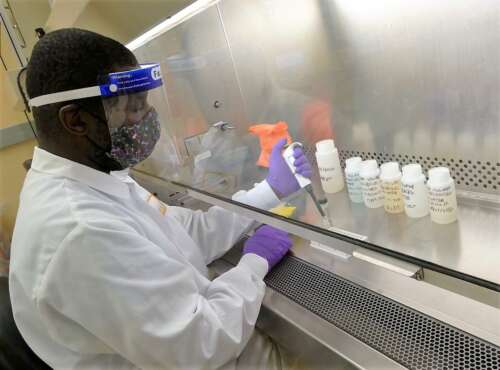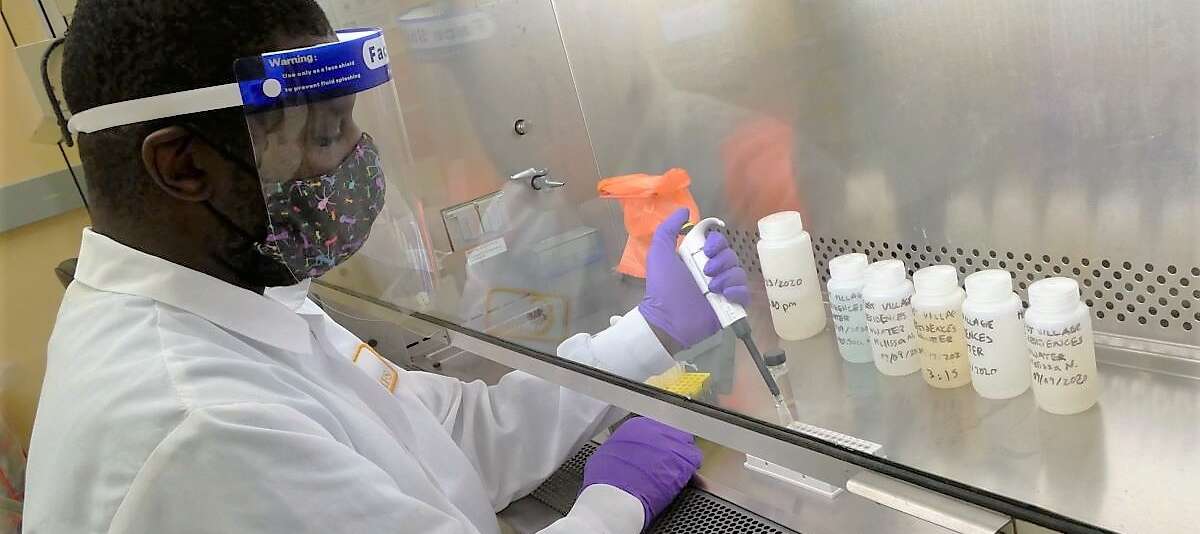Ontario Genomics, Genome Canada, and Illumina are investing in a first-of-its-kind SARS-CoV-2 wastewater surveillance initiative across Ontario. This cutting-edge project will enhance critical province-wide coordination and viral surveillance and support provincial and national efforts to understand how the virus that causes COVID-19, SARS-CoV-2, is changing over time.

This project is made possible through an investment of over $338,000 from Genome Canada, Ontario Genomics, and Illumina.
The funding supports Ontario-wide research efforts, led by Dr. Lawrence Goodridge, University of Guelph, and co-led by Dr. Rob Delatolla, University of Ottawa. It also harnesses the power of an extensive network that consists of members and collaborators from across Ontario and Canada, including CHEO (a pediatric health-care and research centre in Ottawa), University of Waterloo, University of Windsor, Ryerson University, Health Sciences North Research Institute (HSNRI) among others.
“I am proud of Ontario’s leadership in SARS-CoV-2 surveillance in wastewater. Through a coordinated approach, leveraging the province’s deep genomics resources and capacity, this project will provide early signals of worrisome viral changes and equip public health with evidence for timely decision making,” said Dr. Bettina Hamelin, President and CEO, Ontario Genomics. “Our end-to-end view of Ontario’s genomics ecosystem has enabled Ontario Genomics to break down silos and harness genomics expertise in the fight against COVID-19.”
Since the start of the pandemic, many countries have been using wastewater monitoring to identify potential outbreaks before they are detected in people through clinical testing. SARS-CoV-2 can be recognized in human waste up to a week before individuals develop symptoms and in people who remain asymptomatic but may spread the virus. By collecting fecal matter at key wastewater collection sites (for example, long-term care facilities, schools, universities, etc.), we can get an early warning sign at the population level and pre-empt further spread by local public health interventions.
“Using wastewater surveillance to assist in predicting COVID-19 caseloads in Ontario is an excellent example of how genomics research was adapted in the face of the pandemic. This demonstrates how sustained, long-term investments in genomic research prepare us for the unexpected,” said Dr. Rob Annan, President and CEO, Genome Canada. “Genome Canada looks forward to helping leverage this important initiative into national solutions for future pandemic readiness.”
Several jurisdictions in Canada, including Ontario through it’s wastewater surveillance initiative, have been using a surveillance technology (qRT-PCR) to monitor SARS-CoV-2 levels over time. By leveraging modern genomic techniques (metagenomics), this project will enable researchers to identify known Variants of Concern (VOCs) while also staying ahead of the curve on potential new emerging viral changes that could become concerning. Participation of the research team in the wastewater surveillance initiative and strong partnerships between the research team and public health agencies ensure that the results will be shared for rapid actioning as necessary.
“I want to thank Genome Canada, Ontario Genomics and Illumina for their leadership in detecting Variants of Concern through this project, which will support Ontario’s wastewater surveillance initiative by enhancing how we track the spread of the virus,” said Jeff Yurek, Minister of the Environment, Conservation and Parks. “It is through investments and partnerships like this one, in addition to the government’s COVID-19 wastewater surveillance initiative, that we are able to expand wastewater sampling and analysis provincewide and enable more timely decisions about how and where to mobilize resources in response.”
“Only a small percentage of clinical samples in Ontario are being sequenced to identify VOCs,” said Dr. Goodridge, who holds the Leung Family Professorship in Food Safety and is the director of U of G’s Canadian Research Institute for Food Safety. “This timely funding from Ontario Genomics and Genome Canada, and Illumina will allow for surveillance of VOCs in wastewater, increasing our knowledge regarding which VOCs are circulating in the general population.”
“The University of Guelph is delighted and grateful to Ontario Genomics, Genome Canada, and Illumina for the generous support for this incredibly timely, cutting-edge viral surveillance partnership,” said Dr. Malcolm Campbell, vice-president (research). “This wise investment will reinforce our strong partnership with University of Ottawa and enable Profs. Goodridge and Delatolla to conduct vital genomics-based surveillance for viral pathogens, and thereby safeguard public health and improve life.”
“We will now have a province-wide proven epidemiological tool to identify signs of viral prevalence ahead of an outbreak,” said Dr. Robert Delatolla, Associate Professor, uOttawa Faculty of Engineering and project co-lead. “It will prove to be an asset to local public health units in our shared fight against SARS-CoV-2.”
“With this investment, public health officials and researchers will be able to better interpret the wealth of public health data that we flush down the toilet every day,” said Dr. Tyson Graber, Research Associate, CHEO Research Institute. “It’s amazing how quickly this scientific field has matured since the beginning of the pandemic; starting from basic research projects in university labs to a surveillance programme used by public health units across Ontario, providing a clearer picture of how COVID-19 is affecting their community. It is a stellar example of how open science and collaboration across disciplines can benefit all Ontarians.”
